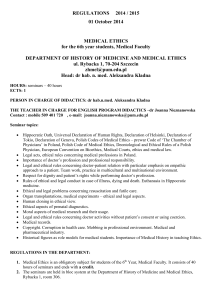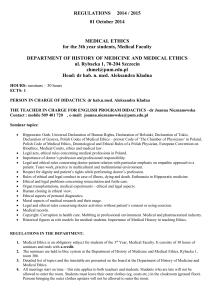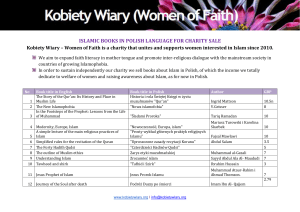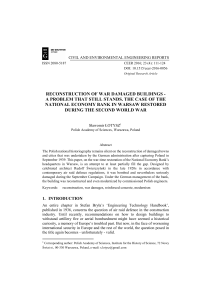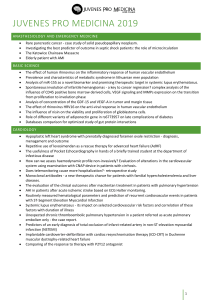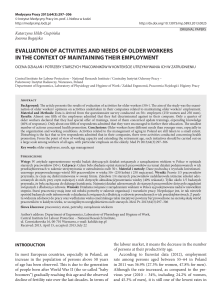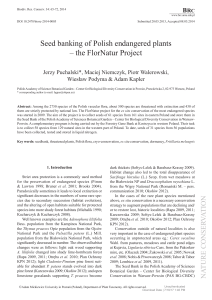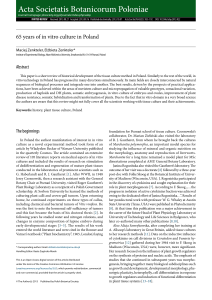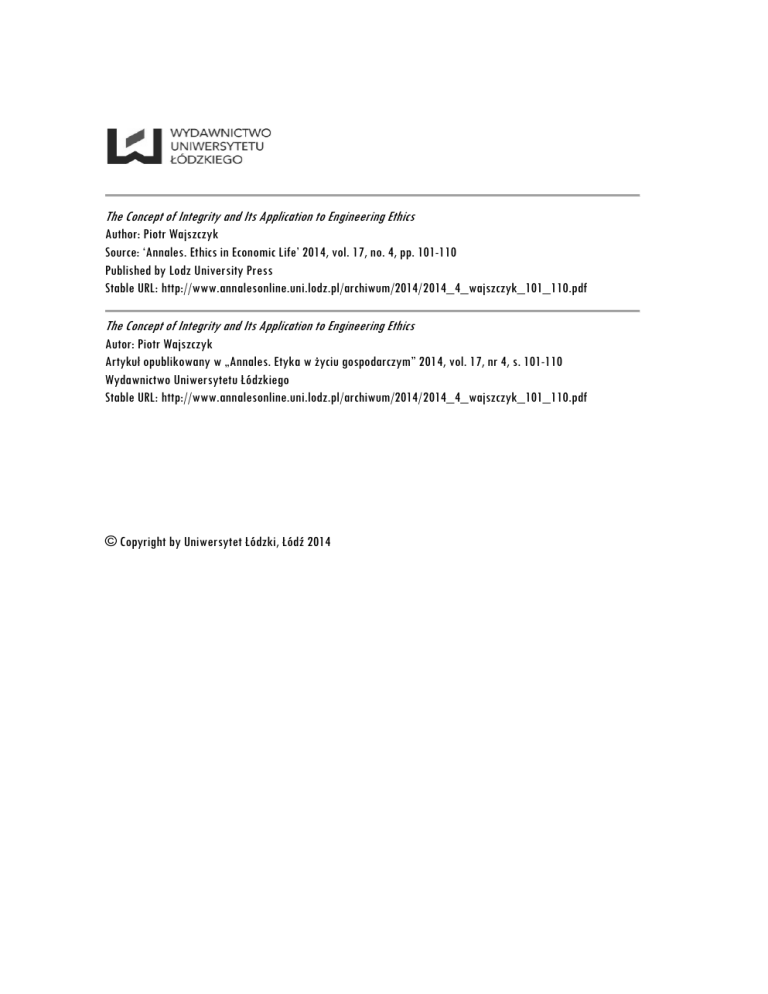
The Concept of Integrity and Its Application to Engineering Ethics
Author: Piotr Wajszczyk
Source: ‘Annales. Ethics in Economic Life’ 2014, vol. 17, no. 4, pp. 101-110
Published by Lodz University Press
Stable URL: http://www.annalesonline.uni.lodz.pl/archiwum/2014/2014_4_wajszczyk_101_110.pdf
The Concept of Integrity and Its Application to Engineering Ethics
Autor: Piotr Wajszczyk
Artykuł opublikowany w „Annales. Etyka w życiu gospodarczym” 2014, vol. 17, nr 4, s. 101-110
Wydawnictwo Uniwersytetu Łódzkiego
Stable URL: http://www.annalesonline.uni.lodz.pl/archiwum/2014/2014_4_wajszczyk_101_110.pdf
© Copyright by Uniwersytet Łódzki, Łódź 2014
Annales. Etyka w życiu gospodarczym / Annales. Ethics in Economic Life 2014
Vol. 17, No. 4, December 2014, 101-110
Piotr Wajszczyk
Lodz University of Technology, Faculty of Mechanical Engineering
Department of Manufacturing Engineering
email: [email protected]
The Concept of Integrity and Its Application
to Engineering Ethics
Abstract
Integrity is a common and well established concept in the ethical vocabulary. It is
also being used in various codes of ethics, and investigated by means of various
methods. However a review of the contemporary reference literature reveals various meanings associated with this term, which is followed by its variable applicability. It is mentioned among the desirable virtues possessed by the professionals.
In various Polish codes of engineering ethics there is an absence of the integrity
concept, at least comprehended as fully as it is in the ethics literature. The paper
contains an analysis of the meaning of integrity in English and its translations into
Polish in selected codes of engineering ethics. The scopes of the used terms are
compared and in result it is postulated that some initiatives be undertaken in order
to clarify the discrepancies existing in various engineering codes of ethics around
the professional integrity concept.
Keywords: engineering ethics, integrity, professional ethics
JEL Classification: A13
1. Introduction
It is an established tenet in ethical literature that integrity plays a fundamental role
among human virtues, especially. in professional life. In order that we achieve it,
we must first learn what it means to us, as engineers, economists, lawyers, nurses
or other professionals. If we grasp its content and on what it depends, it will ena-
102
PIOTR WAJSZCZYK
ble us to devise effective learning, training, or practicing strategies, which bring us
to this end. However, the meaning of this term varies among researchers and research fields across disciplines. The paper depicts some of these meanings and, by
means of the cited literature of integrity, attempts to relate this term to other human virtues established in the course of research. The following sections review
these various meanings of integrity with an attempt to synthesize them and draw
conclusions for further research. The second section analyses popular notions of
integrity in various sources of reference. Sections three, four and five are devoted
to professional integrity applied in engineering.
2. The possible meanings of integrity
The content of ‘integrity’ is defined either by a definitive statement, in a broad
popular sense, or in narrower sense, by its outcomes. The latter will be considered
in a separate paper.
According to Merriam-Webster’s Unabridged Dictionary (2000) the English
term integrity is derived from the Latin integritas and integer, which mean, i.a.,
entire, untouched state of a thing1. Its first meaning of soundness is applied to
personality, health, structural functioning (of brain, currency system or aircraft),
whereas the second facet is focused on the 1st ‘uncompromising adherence to
a code of moral, artistic or other values, utter sincerity, candor, avoidance of deception, expediency, artificiality, or shallowness of any kind (physical vigor, business integrity and thrift)’. When someone is said to be of integrity, it is implied he
has a duty towards his opinions and behaviours expressed and revealed. The alternative meaning of this entry is 2nd ‘the quality or state of being complete or undivided [in terms of] material, spiritual, or aesthetic wholeness: organic unity: entireness, completeness’. This sense of integrity is applied to a range of objects,
from an empire, persons, poems, ideas or aesthetic experiences.
Another and even more comprehensive source of reference, Roget’s International Thesaurus classifies this term in eight discriminated possible fields of
meaning (despite some overlap): (1) artlessness (a. ingenuousness, b. guilelessness; c. simplicity; d. unsophistication; e. innocence; f. openness; g. candor); (2)
probity (a. honesty; b. rectitude; c. uprightness; d. righteousness; e. goodness;
f. decency; g. honor; h. (good) character; i. fairness); (3) wholeness (a. whole,
b. totality; c. entirety; d. unity; e. wholeness); (4) completeness (a. totality;
b. wholeness; entireness; c. entirety; d. unity; f. thoroughness); (5) simplicity
(a. purity; b. plainness; c. unadulteration; d. singleness); (6) particularity (a. individuality; b. singularity; c. differentiation; d. personality; e. selfness; f. egohood;
g. nonconformity; h. individualism); (7) oneness (a. unity; b. singleness; c. individuality; d. particularity; e. uniqueness; f. unification; g. solidification; h. indivisibility; i. wholeness); (8) soundness (a. intactness; b. wholeness; fullness) 2.
1
2
Merriam-Webster’s Unabridged Dictionary, 2000.
Roget’s International Thesaurus, 7th ed., Harper Collins Publ. 2010.
THE CONCEPT OF INTEGRITY...
103
These two reference sources offer possibly the most comprehensive scope of
applicability for the term to designate qualities of various objects in the English
language. Although they use different classification approaches, they generally
converge on the common denominator for integrity, perhaps with the exception of
the 6th meaning of the latter source of reference (‘particularity’). Other sources of
reference: Concise Oxford English Dictionary3, Collins Cobuild English Dictionary4, and Longman Dictionary of American English 5 give one or two of the above
mentioned fields of meaning (Merriam-Webster’s 1st and 2nd).
This foreign term is usually used more narrowly in the Polish language to denote mostly two meanings. One of them is indivisibility and wholeness (integralność) of an object referred to6, usually data, body, the state or its territory. Alternatively it is translated into honesty (uczciwość, prawość), whenever referred to an
engineer, businessperson, trader, or a manager 7. There are therefore many marked
differences in the meaning of this term used in English and its corresponding uses
in Polish or in translations into Polish. The English term inherently contains
a positive, healthy aspect in the term integrity, whereas its Polish counterpart,
integralność, merely conveys either the meaning of wholeness or unity without
such a normatively positive ‘colouring’.
3. Integrity – the aim of professional engineering and scientific
moral practice
One of the popular textbooks8 used for engineering ethics teaching in the United
States mentions integrity as one of the learning outcomes at the end of the ordered
list. It is the last one (tenth) after moral awareness, cogent moral reasoning, moral
coherence, moral imagination, and moral communication (the so called direct
goals in college courses, which centre on cognitive skills – skills of the intellect in
thinking clearly and cogently). They are followed by moral reasonableness, respect for persons, tolerance of diversity, and moral hope (which specify aspects of
moral commitment and responsible conduct). Integrity is considered there as the
most comprehensive and the most difficult to obtain and maintain of the professional outcomes in the course of the whole ethical education and lifelong practice.
3
Concise Oxford English Dictionary, 11th ed., Oxford University Press, Oxford 2004.
Collins Cobuild English Dictionary, 4th ed., Harper Collins Publ. 2003.
5
Longman Dictionary of American English, 4th ed., Pearson Education 2009.
6
Wielki słownik wyrazów obcych PWN, ed. M. Bańko, Wydawnictwo Naukowe PWN, Warsaw 2005,
p. 551.
7
Słownik terminologii prawniczej i ekonomicznej angielsko-polski, eds. J. Jaślan, H. Jaślan, Wiedza
Powszechna, Warsaw 1991, p. 335; Słownik naukowo-techniczny angielsko-polski, eds. M. Skrzyńska,
S. Czerni, T. Jaworska, E. Romkowska, Wydawnictwa Naukowo-Techniczne, Warsaw 1982, p. 407;
Stanisławski J., K. Billip, Z. Chociłowska, Podręczny słownik angielsko-polski, Wiedza Powszechna,
Warsaw 1983, p. 373.
8
M.W. Martin, R. Schinzinger, Introduction to Engineering Ethics, McGraw Hill International Edition,
New York 2010, p. 11.
4
104
PIOTR WAJSZCZYK
This goal is defined there as ‘maintaining moral integrity and integrating one’s
professional life and personal convictions’9. Its importance is especially visible
among senior engineer decision makers who decide on, manage and evaluate
complex and remarkable investment projects, or become involved in public or
government management, since ‘morally admirable engineers (…) accept their
obligations and are conscientious in meeting them. They diligently try to do the
right thing, and they largely succeed in doing so, even under difficult circumstances. In this sense, being responsible is a virtue – an excellence of character’10. Integrity is one of the most fundamental virtues, and accounted to the selfgovernance virtues which are necessary in exercising moral responsibility. Among
these virtues we can find those which centre on moral understanding and perception: e.g., self-understanding and good moral judgment. Aristotle calls them practical wisdom (phronesis, φρόνεσις)11. They are necessary for any ethical professional practice. This will require the combined grasp of particulars: astuteness,
perception, and understanding, making up phronesis, which direct a person toward
the right action. Second, Aristotle treats them as practical (but not moral) virtues,
which become good only when exercised as a part of good professional practice
based on prior consideration of what is good for a man or society 12. St. Thomas
Aquinas, his great proponent, called the practical wisdom prudence and determined it to be a composite of virtues: εύβουλία, σύνεσις, and γνώμη. The first of
them denotes a habit whereby we take good counsel, the second denotes the excellence of judgment related to common law, and the third – refers to the excellence
of judgment according to the natural law13. Other self-governance virtues such as
courage, self-discipline, perseverance, conscientiousness, fidelity to commitments,
and self-respect, centre on commitment and on putting understanding into action.
It appears clear then that the integrity of a person should always be associated with
good acts. The possibilities of combining vices with virtues, or within virtues,
should always be avoided as far as possible. The more they should be dissuaded,
the more instances appear in ethical literature, which indicate that authors try to
ascribe some components of integrity to deeply immoral individuals like Adolph
Hitler or Bernard Madoff. In these cases coherence of words with actions or some
acceptable external conduct do not imply by default the underlying personal virtue
– integrity. There are examples of professional engineers (like Roger Boisjoly),
who attained a high level of integrity and showed its applicability in life staking
circumstances.
9
Ibidem.
Ibidem, p. 17.
11
Aristotle, Nicomachean Ethics, Cambridge Texts in the History of Philosophy, translated and edited
by R. Crisp, Cambridge University Press, Cambridge 2004, Book VI, Ch. 5, p. 107.
12
‘Practical wisdom, then, must be a true state involving reason, concerned with action in relation to
human goods. Moreover, while there is a virtue in skill, there is none in practical wisdom. In skill the
person who misses the mark voluntarily is preferable, but with practical wisdom, as with the virtues,
the reverse is true. Clearly, then, practical wisdom is a virtue and not a skill’. Ibidem, p. 108.
It cannot be then a substantive moral virtue, always good in itself, such as honesty, beneficence, σοφία,
and νους are.
13
St. Thomas Aquinas, Summa Theologica, literally translated by the Fathers of the English Dominican
province, Burns Oates & Washbourne Ltd., London 1921, Ia IIæ, q. 57 a. 6.
10
THE CONCEPT OF INTEGRITY...
105
Integrity in science and engineering has for long time been used mostly for
denoting acts opposed to scientific misconduct, rather than for exposing a model
or paragon of professional practices, be it individual, organizational or social. For
example the scientific misconduct triumvirate, fabrication, falsification of scientific findings, and plagiarism (FFP), has been analysed in the professional ethics
literature and denounced as opposed to integrity in science and engineering. According to a definition of FFP, these practices comprise ‘(…) misappropriation,
interference in scientific research activities and misrepresentation as the principle
aspects of scientific misconduct. The notion of misappropriation includes not only
plagiarism but also the misuse of information obtained through the confidential
review process (…) omission of relevant findings or information that, as an intended or foreseeable consequence, results in deception’14.
This facet of compromised integrity in science and engineering is covered by
instances of methodology shortcomings, both in a form of wrong research design,
superficial (but cheaper) experimental conduct of tests, or compromised data processing and evaluation. These intended or negligently allowed instances of research behaviour result in low quality or completely falsified research results. One
of the possible remedies are multiple checks and controls at various stages of the
research process, but even despite them the research may still fall short of the
desired outcomes. This is due to the increased competition among research
groups, and individual researchers, whereby the competing interests may have
intentional or unintentional adverse impact on how results are influenced, gathered, interpreted and presented. The competition may also have an influence on
the evaluation of a competing research work, even without overtly known credentials on this evaluated work (peer review process). In the highly specialized areas
there may by few experts who are capable of competent evaluations of one another, therefore they know one other, even in the double blind refereed reviews. This
is especially problematic in case of competition for funding or patents and requires
particularly high moral standards and integrity from the reviewers.
Other spheres of compromised integrity are represented by the lack of integrity in information provision to and from the society and the environment. These
cases take the form of misleading advertising, false or malicious gossip against
competitor, researcher or their group, disclosure of proprietary, confidential information, and acceptance and use of projects without the consent of the authors
or proprietors. Unauthorized access to, or dual use of, certain proprietary information and works both physical and intellectual also pose a problem to the
maintenance of integrity.
Recently, however, there has been a notable shift from the negative meaning
of what integrity does not mean to what integrity actually is in the professional
ethics literature. Authors agree that it ‘generally means maintaining high moral
14
Science and Technology Ethics, ed. R.E. Spier, Routledge: Taylor & Francis Group, London, New
York 2002, p. 30 n.
106
PIOTR WAJSZCZYK
standards and doing superior work in a professional capacity, as opposed to merely avoiding misconduct’15.
4. Integrity – the moral end in various codes of engineering ethics
It is a general rule, that all of the international codes of engineering ethics contain,
use and require from their members the highest standards of integrity. In this context the term is used in the meaning of soundness of values, honesty and adherence to uncompromised conduct procedures 16 . It is worth noting here that the
NSPE code singles out honesty from integrity explicitly, which implies the meaning of the latter as different from honesty itself, although equally important.
When we come to Polish translations of international codes, we encounter the
ambiguities mentioned in the first paragraph of this paper. The FEANI-NOT Code
of Ethics can serve here as a good example 17. In the section of personal ethics its
explicit Polish translation mentions the professional integrity (integralność
zawodowa) related to professional conduct, which sounds somewhat awkward in
this context. As shown in the previous paragraph the term integrity is used both in
relation to personal values: soundness, honesty, individualism, candour or nonconformity as well as being applicable to abstract objects, non-personal beings or
procedures. In contrast, the corresponding meaning of this term in Polish (integralność) suggests merely the wholeness or unity of professional conduct. This
difficulty in translation, and resultant ambiguity, pose a great difficulty to the
proper understanding of what actually is required in the FEANI code, and consequently, what should be observed by members of the profession.
The corresponding terms, which contain or directly refer to integrity, have
been used in other Polish codes of engineering ethics with various meanings. 18
15
T. Iseda, How Should We Foster the Professional Integrity of Engineers in Japan? A Pride-Based
Approach, “Science & Engineering Ethics” 2008, vol. 14, No. 2, p. 166.
16
According to the Preamble of the National Society of Professional Engineers (NSPE) Code of Ethics
(rev. 2005): ‘Engineering is an important and learned profession. As members of this profession,
engineers are expected to exhibit the highest standards of honesty and integrity’. In Code of ethics
(1997) by Accreditation Board for Engineering and Technology (ABET) Fundamental Canons: ‘(…) 6.
Engineers shall act in such a manner as to uphold and enhance the honor, integrity and dignity of the
profession’ and ‘(…) Suggested Guidelines, art. 3e: Engineers shall be dignified and modest in explaining their work and merit, and will avoid any act tending to promote their own interests at the
expense of the integrity, honor and dignity of the profession’. While in IEEE Code of Ethics (2006):
‘Article I (…) 5. Advance the integrity and prestige of the engineering profession by practicing in
a dignified manner and for adequate compensation’. [emphasis added].
17
Kodeks FEANI-NOT: ‘1. Etyka osobista: (…) Jego integralność zawodowa oraz uczciwość intelektualna gwarantują obiektywność analiz, ocen, jak również podejmowanie konsekwentnych decyzji’. In
English this corresponding sentence is the following: ‘His professional integrity and intellectual honesty shall be the guarantees of his impartiality of analysis, judgment and consequent decision’. In the
author’s opinion the translation of this sentence which reflects better sense of integrity used in this
context should be following: ‘Jego integralność i wzorowość zawodowa oraz uczciwość intelektualna
będą gwarancjami bezstronności analiz, ocen i wynikających z nich decyzji’. [emphasis added].
18
Examples of Polish codes of engineering ethics: SIDiR: ‘1. (…) Członkowie tej grupy zawodowej,
(…) starają się oferować usługi zgodnie z zasadami moralnymi i cywilizacyjnymi opartymi o uczci-
THE CONCEPT OF INTEGRITY...
107
They most often use synonyms (honesty), which narrow down the original meaning of the term, and not cover fully its original sense, discussed in previous paragraphs. Specifically, these phrases lack an explicit use of integrity in its meaning
of individualism, identity, purity, soundness, correctness, unadulterated and uncorrupted state of a thing, exemplary procedure, behaviour, or attitude. Of course,
such use of the term integrity implicitly assumes the existence of a model, ideal or
paragon of such a desired object. This assumption is most often substantiated, as
the very codes refer to some pre-existing models of conduct specified in other
documents and sources, and impose norms of their observance. Any deviation
from such a model may become indicative of norm violation and compromised
integrity. The codes of ethics must agree in scope and content, otherwise either the
scope or content of regulations, or both, will not overlap. Thereby, in fact, these
codes, the original and their Polish accepted translations, are not comparable in
their actual professional obligations imposed on the professional society members,
at least in this particular aspect, in terms of the attainment of the professional or
personal integrity. However, it is important that a reader of a code of ethics has
a clear and exact meaning of the terms that impose moral obligation on professional conduct, be they in English or in Polish. It is all the more imperative, as the
codes are norm-setting documents: they do not provide information on what the
norms actually are in the community, but on what they should be.
Engineering organizations report their repeated efforts to maintain the organizational focus on the professional integrity issue, as they find it to be the key
component of success, along with quality and sustainability. 19 They found that
corruption, the opposite of integrity – at least comprehended as the synonym of
honesty – is positively associated with a demand for corruption, the supply of
corruption, and the condoning side of it, which silently accepts its existence but
does nothing to prevent it.
5. The meaning of integrity in engineering practice
The article proposes the complementary term of ‘wzorowość’ (exemplarity) be
used in translation of integrity into Polish in various codes of ethics. There are
wość, bezstronność, słuszność i sprawiedliwość. (…) 5. Inżynier konsultant wydaje oświadczenia
publiczne w sposób obiektywny, uczciwy, prawdziwy’. Kodeks etyki Polskiej Izby Inżynierów Budownictwa (PIIB): ‘(…) 2. Inżynier a społeczeństwo: W swej działalności inżynier kieruje się dobrem
publicznym oraz zasadami uczciwości zawodowej i osobistej’. Kodeks Zasad Etyki Zawodowej Urbanisty: ‘Rozdział II: Obowiązki urbanisty wobec kraju i społeczeństwa: 1. Urbanista w swojej działalności zawodowej powinien kierować się porządkiem prawnym Rzeczypospolitej Polskiej, uczciwością
i obiektywizmem. (…) Rozdział V: Obowiązki urbanisty wobec innych urbanistów (…) 2. Urbanista
powinien przestrzegać wobec innych urbanistów zasad koleżeństwa, uczciwości i lojalności’. Kodeks
Polskiego Związku Inżynierów i Techników Budownictwa: ‘Rozdział II: Inżynier a społeczeństwo: W
swej działalności inżynier kieruje się dobrem publicznym, zaś w swoim postępowaniu zawodowym
zasadami uczciwości. (…)’.
19
J.M. Boyd, J.D. Padilla, FIDIC and Integrity: A Status Report, “Leadership and Management in
Engineering” 2009, vol. 9, No. 3, pp. 125-128, http://dx.doi.org/10.1061/(ASCE)1532-6748(2009)9:3
(125), p. 125.
108
PIOTR WAJSZCZYK
several arguments in favour of the use of the above term. First, it is important that
in case of any international research the concepts have their full coverage of content correspondence of terms in a given language. Second, the code must be understandable by the engineers without any doubts. Otherwise misunderstanding or
doubts would either add to their attitude of indifference toward the code or produce doubtful professional conscience or wrongful practices. Third, integrity is
a virtue, although adjunctive, not substantive 20, yet it has strong bonds with exemplarity used in virtue ethics. Fourth, the professional norms of behaviour are
commonplace in engineering practice, and so they should be well easily comprehensible in terms of the exemplary behaviours referred to in the codes of ethics.
Fifth, it is crucial in the codes to describe the desired professional conduct in
terms of the virtues, exemplary attitudes and integration of them, rather than integration of any attitudes or any traits of character. The latter case might have taken
place had the notion of integrity had not its ‘healthy’ and ‘exemplary’ connotations in translations. Eventually, the integrity concept is measurable: the exemplarity, both eidetic and teleological21, is more easily conceivable and any departure from it would be more easily reported than the departure from the process of
integrating. It can also be treated in a broader sense regardless of any particular
moral theory, as suggested by Audi and Murphy22.
There are also some other reservations: its translation into integralność is derived directly from the etymological root and conveys the ambiguous possibility
of integrating both virtues and vices. Additionally, the term emphasizes the need
to integrate one’s personality, and stresses dynamism rather than static reliance on
some exemplary ideals. If it remains in use though, it can be explained in commentary to the code, provided that it is possible and there is space given for it.
Integrity for an engineer should reflect above all the various facets of his professional responsibilities. Some authors replace research integrity with two notions: epistemic integrity23, a notion which focuses on the reliability of the results
of research, and a moral notion of integrity, which concerns the moral acceptability of research practices. The first one is still confined only to the epistemology of
science (natural), not necessarily to other epistemologies. The authors, having
considered various definitions of integrity, offer their own: ‘[they] define the epistemic integrity of a practice as a function of the degree to which the statements
resulting from this practice are deceptive. The more deceptive these statements,
the lower the epistemic integrity of the practice’.24 Additionally, the results are
confined mostly to biomedical research, and the authors do not resort to other
categorical dimensions which determine and explain the core concept. Its brevity
is achieved by using only the degree of deceptiveness of statements or behaviours
resulting in research practice.
R. Audi, P.E. Murphy, The Many Faces of Integrity, “Business Ethics Quarterly” 2006, vol. 16, No.
1, pp. 3-21.
21
T. Ślipko, Zarys etyki ogólnej, Wydawnictwo WAM, Cracow 2004, p. 210.
22
R. Audi, P.E. Murphy, op. cit.
23
J. De Winter, L. Kosolosky, The Epistemic Integrity of Scientific Research, “Science & Engineering
Ethics” 2013, vol. 19, No. 3, pp. 757-774. doi: 10.1007/s11948-012-9394-3.
24
Ibidem, p. 761.
20
THE CONCEPT OF INTEGRITY...
109
6. Conclusions
The above discussion was intended to clarify some of the discrepancies of integrity existing in various editions and translations of codes of engineering ethics, both
Polish and international. The differences may appear to be quite voluminous in
content and meaning, if we consider the systematic reductions in the meaning of
the term, which often used to be the case in routine translations. These portions of
the lost content may later have an adverse effect on the desirable professional
conduct, which will gradually disappear from the professional practice. It is imperative then that the proper integral meaning of this valid and fundamental term
be maintained and reflected in further editions of the professional codes. It is
equally important that they be conscientiously applied by the professional society
members, with full understanding of the adverse effects in case of any negligence.
Two broad approaches are notable in the integrity literature: one prevailing in
the social sciences, which relates the term to human virtues as its components, and
uses interview methods for determining their content, influence on behaviour, etc.
The other approach applied in the natural sciences assumes the existence of one
truth, and the deviation from it becomes a measure of deception – an opposite to
integrity. These two approaches provide complementary views on the reality: the
applicability of integrity in various professional and non-professional environments. They offer deeper, sociological and psychological insights into ethical
analyses.
The article proposes the use of a synonym of integrity, when translated into
Polish – wzorowość (exemplarity), because it makes up for the shortcoming in the
content of the sole use of integralność discussed above.
Future integrity measures applied to science and engineering communities
should comprise both aspects of negative behaviours and attitudes as described
above as well as positive ones specific to this professional community. An attempt
should be made to integrate the meaning of the term across social and natural
sciences, so as to arrive at a synthetic notion of integrity applicable to the wider
population of professional individuals.
References
Accreditation Board for Engineering and Technology (ABET) Code of ethics, 1997.
Aristotle, Nicomachean Ethics, Cambridge Texts in the History of Philosophy, translated
and edited by R. Crisp, Cambridge University Press 2004.
Audi R., P.E. Murphy, The Many Faces of Integrity, “Business Ethics Quarterly” 2006, vol.
16, No. 1, pp. 3-21.
Boyd J.M., J.D. Padilla, FIDIC and Integrity: A Status Report, “Leadership and Management in Engineering” 2009, vol. 9, No. 3, pp. 125-128, http://dx.doi.org/10.1061/
(ASCE)1532-6748(2009)9:3(125).
110
PIOTR WAJSZCZYK
Collins Cobuild English Dictionary, 4th ed., Harper Collins Publ. 2003.
Concise Oxford English Dictionary, 11th ed., Oxford University Press 2004.
De Winter J., L. Kosolosky, The Epistemic Integrity of Scientific Research, “Science &
Engineering Ethics” 2013, vol. 19, No. 3, pp. 757-774. doi: 10.1007/s11948-0129394-3.
IEEE Code of Ethics, 2006.
Iseda T., How Should We Foster the Professional Integrity of Engineers in Japan? A PrideBased Approach, “Science & Engineering Ethics” 2008, vol. 14, No. 2, pp. 165176.
Kodeks etyczny Polskiej Izby Inżynierów Budownictwa (PIIB), 2007.
Kodeks FEANI-NOT (www.not.org.pl), 2008.
Kodeks Polskiego Związku Inżynierów i Techników Budownictwa, 2011.
Kodeks Stowarzyszenia Inżynierów Doradców i Rzeczoznawców, 2010.
Kodeks Zasad Etyki Zawodowej Urbanisty, 2006.
Longman Dictionary of American English, 4th ed., Pearson Education Limited 2009.
Martin M.W., R. Schinzinger, Introduction to Engineering Ethics, McGraw Hill International Edition, New York 2010.
Merriam-Webster’s Unabridged Dictionary, Merriam-Webster, Inc., 2000.
National Society of Professional Engineers (NSPE) Code of Ethics (rev.) 2005.
Roget’s International Thesaurus, 7th ed., Harper Collins Publ. 2010.
Science and Technology Ethics, ed. R.E. Spier, Routledge: Taylor & Francis Group, London, New York 2002.
Ślipko T., Zarys etyki ogólnej, Wydawnictwo WAM, Cracow 2004.
Słownik naukowo-techniczny angielsko-polski, eds. M. Skrzyńska, S. Czerni, T. Jaworska,
E. Romkowska, Wydawnictwa Naukowo-Techniczne, Warsaw 1982.
Słownik terminologii prawniczej i ekonomicznej angielsko-polski, eds. J. Jaślan, H. Jaślan,
Wiedza Powszechna, Warsaw 1991.
St. Thomas Aquinas, Summa Theologica, literally translated by the Fathers of the English
Dominican province, Burns Oates & Washbourne Ltd., London 1921.
Stanisławski J., K. Billip, Z. Chociłowska, Podręczny słownik angielsko-polski, Wiedza
Powszechna, Warsaw 1983.
Wielki słownik wyrazów obcych PWN, ed. M. Bańko, Wydawnictwo Naukowe PWN, Warsaw 2005.

